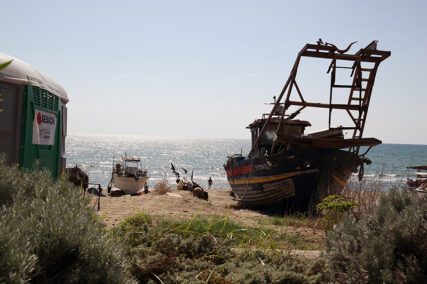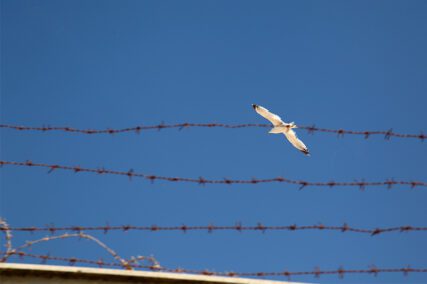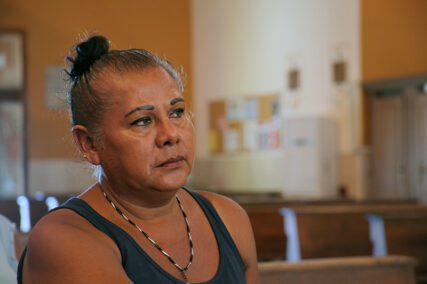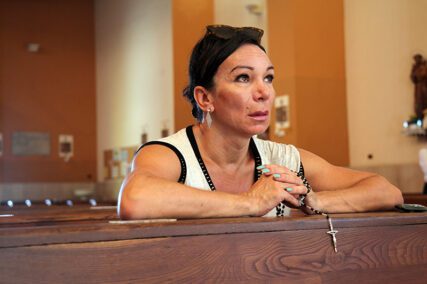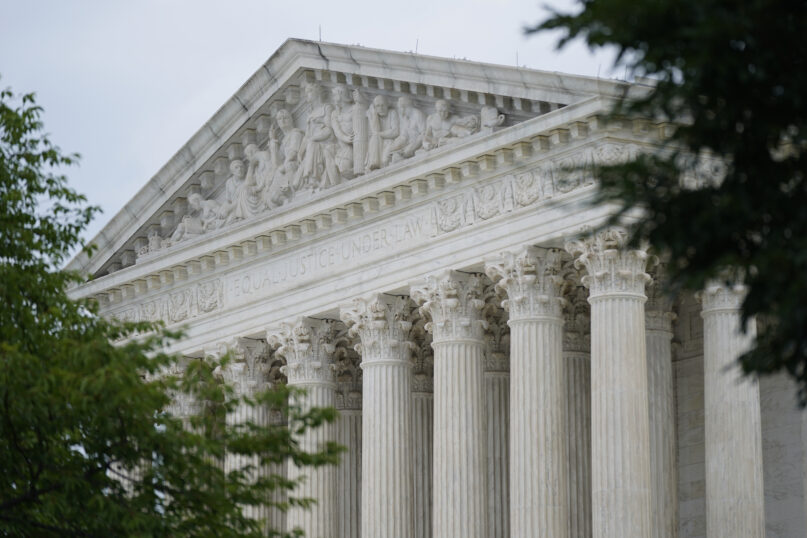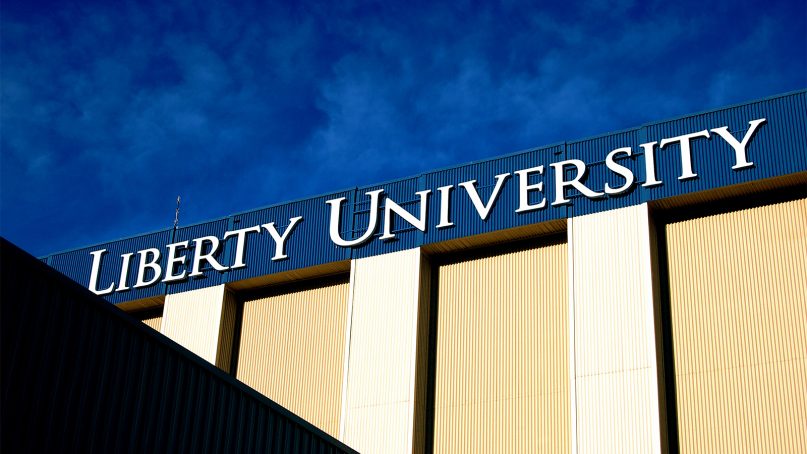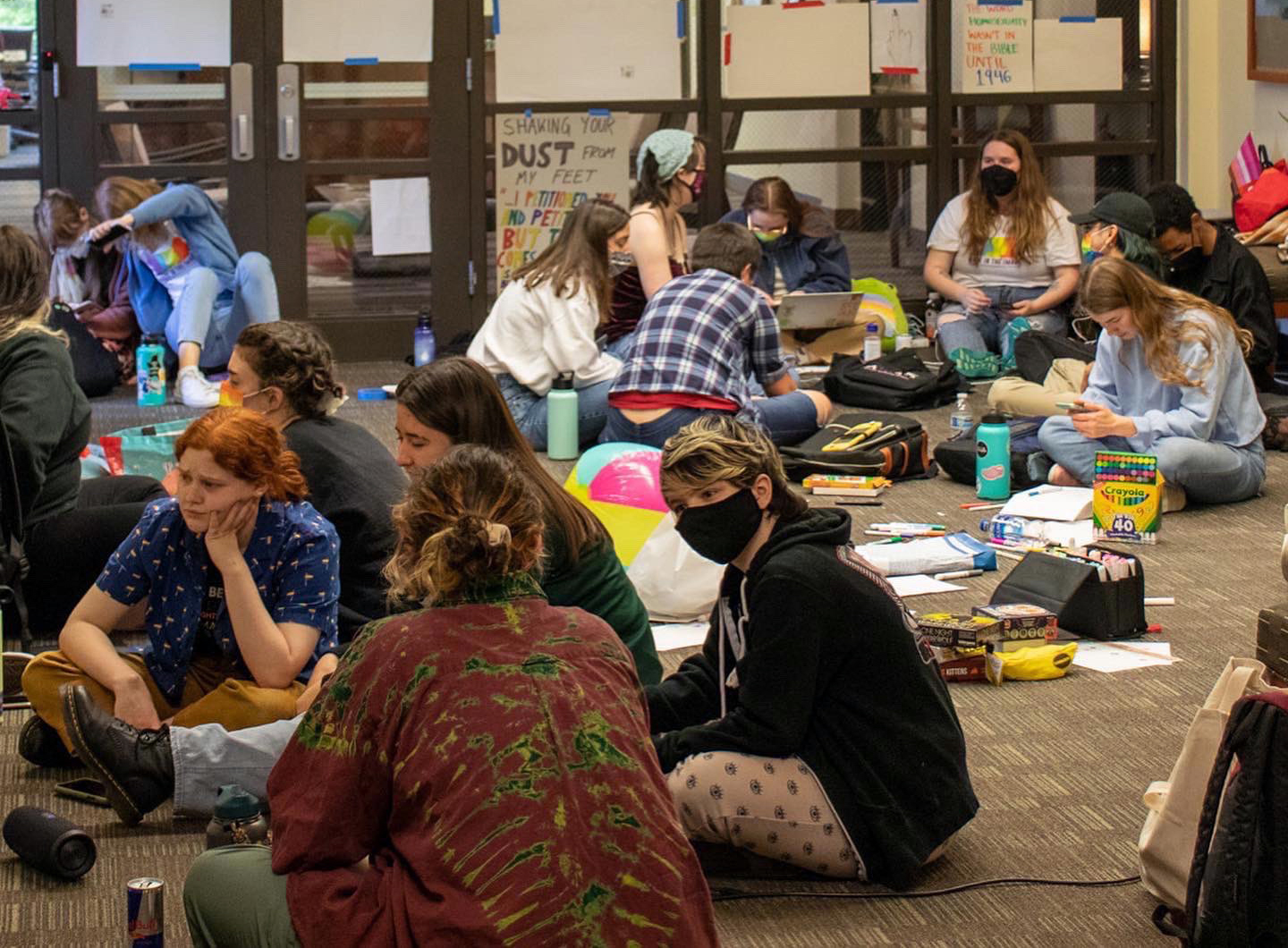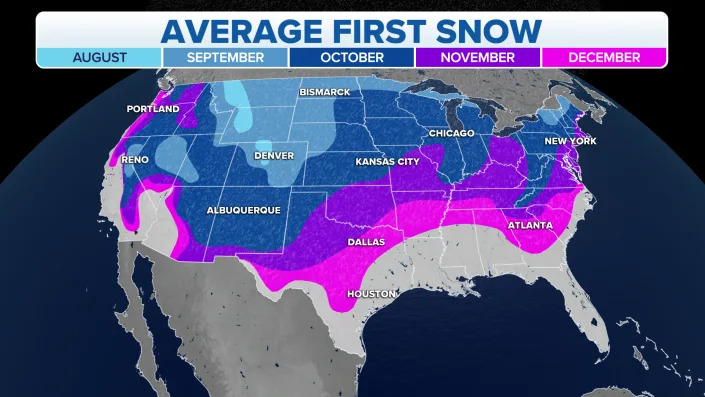How Pope Francis’ welcoming message transformed a trans community in Rome
While Pope Francis' steps toward openness to the LGBTQ community haven't changed church doctrine, outside Vatican circles they have been seen as earthshaking.
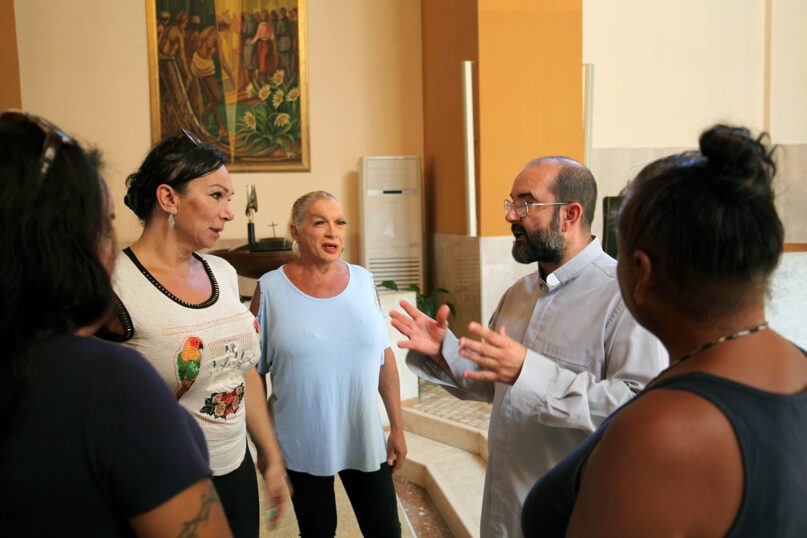
VATICAN CITY (RNS) — The Church of the Immaculate Blessed Virgin looks out onto the Mediterranean from Torvaianica, a beach town just 20 miles from Rome known more for its Mafia incursions, drugs and sex trafficking than its scenery. On a recent gray morning on its littered streets was a single pigeon wing — debris from fights with local gulls.
Immaculate Blessed Virgin’s high red brick façade conceals a rather low-vaulted interior, which on this morning was fragrant with the perfume of the lilies strewn on the floor, left over from a celebration for the Assumption of Mary a few days before. A handful of middle-aged parish volunteers were at work cleaning up the church.
The Rev. Andrea Conocchia, the pastor, showed up in sweatpants and a T-shirt reading “God is great and Jesus loves me,” a gift for his 25th anniversary of celebrating his first Mass. He apologizes for his voice, still worn out from guiding the Mary procession down the windy beach.
Conocchia said he’s a big fan of liturgies, Masses and processions, but he prefers ministry that is immersed in his community. His primary tools as a priest appear to be a bright orange car and his cellphone, which erupts constantly with WhatsApp messages. His favored office is the coffee shop overlooking the beach just off Torvaianica’s main square.
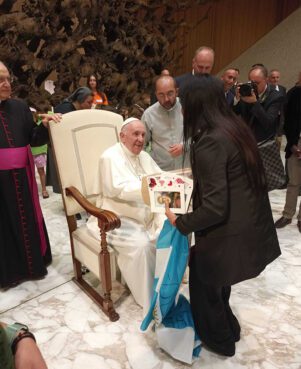
The Rev. Andrea Conocchia, center, introduces members of the Torvaianica community to Pope Francis on Aug. 11, 2022, during the pope’s general audience at the Vatican. Photo courtesy of the Rev. Andrea Conocchia
“I’m not just a priest at the altar. I am a priest right now!” he explained as he loaded up with cups of espresso and chunks of jam tart in the coffee bar for the team tidying up after the revelries.
But in the past two years, Conocchia has gained fame for serving a particular community that found him shortly after he arrived at Blessed Virgin: a group of trans women whose lives he has changed both practically and spiritually. Since April, at the invitation of the Vatican, Conocchia has brought four groups of LGBTQ people to meet Pope Francis and receive needed medical care.
The trips, he said, have allowed fathers struggling with their children’s sexuality to find redemption. Since becoming known for his work in Torvaianica, he conducts prayer sessions via Zoom with disenfranchised LGBTQ Catholics across Italy.
The trans women in Torvaianica sought out Conocchia for basic needs. Most of them sex workers, they had been left without clients, and therefore income, by the pandemic. Because many are HIV-positive, they are at higher risk for serious illness. As immigrants, they could not take advantage of Italy’s health care system.
“When the pandemic hit, we as trans people had to knock on doors because we had nothing to eat,” said Claudia Salas in a mix of Italian and her native Argentine Spanish. “When I went to the church, they closed the door on me,” she said about a nearby parish. “They suggested to go to the parish of Torvaianica.
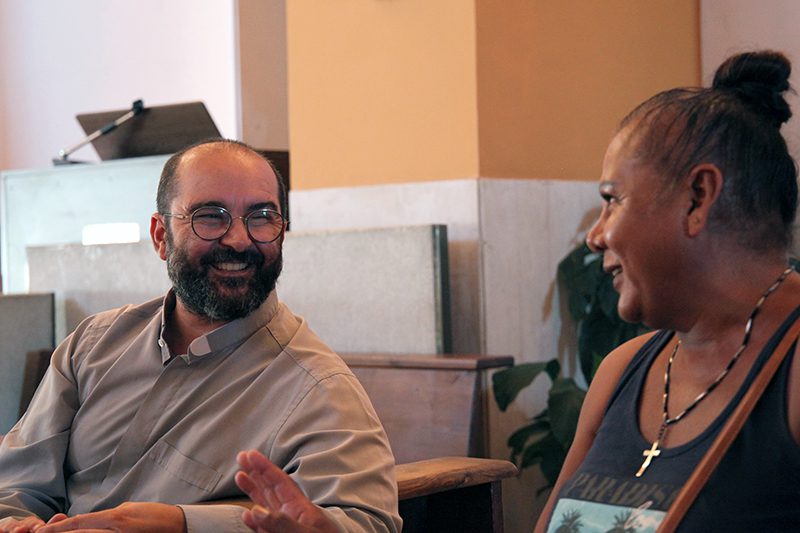
The Rev. Andrea Conocchia shares a laugh with Claudia Salas at the Church of the Immaculate Blessed Virgin on Monday, Sept. 5, 2022, in Torvaianica, Italy. RNS photo by Federico Manzoni
“Don Andrea was the only one to bring God to us,” Salas said, her grief repeatedly spilling over into tears. She said Conocchia brought pasta, vegetables and other staples to their homes.
After meeting Conocchia, Salas, who transitioned when she was 11, urged other trans women to go to the parish at Torvaianica.
Conocchia had arrived at Blessed Virgin months before from a small chapel in Lido dei Pini, a half-hour down the coast. Given the chapel’s tiny capacity, he said, he spent much of his time preaching on the streets — it was in Lido dei Pini that he traded his cassock for the more practical pants and T-shirt. Torvaianica was a shock at first. “Everything was locked,” he said. “It was like entering a cloistered monastery.”
- Boats along the beachfront in Torvaianica, Italy. RNS photo by Federico Manzoni
- A bird flies over barbed wire in Torvaianica, Italy. RNS photo by Federico Manzoni
As the pandemic descended on Italy, the Italian government demanded that churches close. Conocchia obeyed until one morning after saying Mass to the nuns who live at the church complex, he saw a line of people in the church’s piazza. “They were families, people dependent on undeclared or seasonal work, migrants, and in the crowd there were three trans women,” he said.
Despite fears of spreading COVID-19, not least to his aging mother who lives with him, Conocchia opened the doors. The second day there were four trans women, he said; the next there were eight.
At first, he offered the trans women food and money through the local chapter of Caritas, the Catholic charitable organization. He helped Salas get documented and find work as a cleaner, seamstress and cook to get her off the streets.
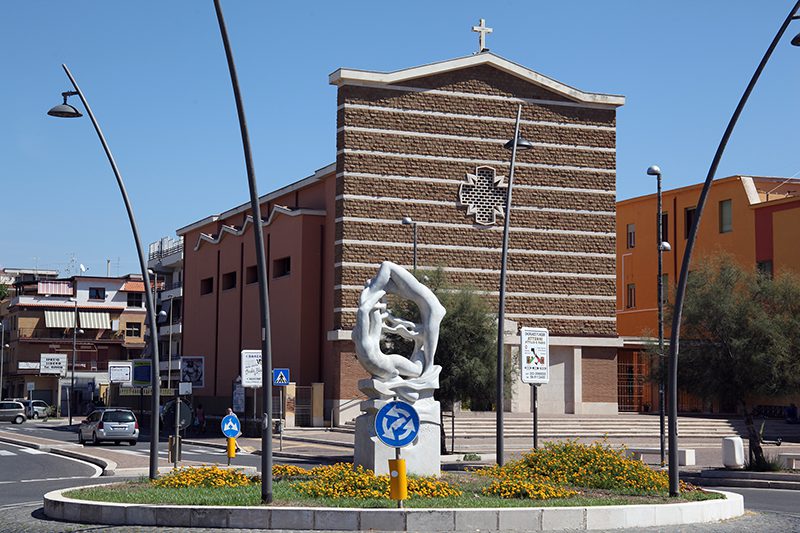
The Church of the Immaculate Blessed Virgin on Monday, Sept. 5, 2022, in Torvaianica, Italy. RNS photo by Federico Manzoni
As their numbers continued to grow, he came up with idea of having the women write to the pope. They told him they were ashamed to describe their lives to the pope. Several wept to think of it.
But the letters went to Rome, and in April 2020, the pope sent money and food to Blessed Virgin through Cardinal Konrad Krajewski, the papal almoner, the official dispenser of Francis’ philanthropy. The 58-year-old Pole is known for diving into sewers to restore electricity to Roma refugee camps. More recently Francis sent Krajewski to Ukraine, where he has met with refugees and blessed mass graves.
Since early in his pontificate, Francis has taken a novel approach to LGBTQ issues, beginning with his reply in 2013 to a question about gay priests: “Who am I to judge?” He has met with a Spanish trans man and his partner at the Vatican and praised the work of the Rev. James Martin, the American Jesuit who advocates for inclusion for LGBTQ Catholics.
Last year, not long after the Vatican’s office of doctrine issued a document calling the blessing of same-sex couples a sin, Francis overhauled the office and removed those responsible.
Francis has stopped short of definitively changing Catholic teaching, which still regards homosexuality as “intrinsically disordered.” He has called gender theory a form of “ideological colonization,” especially when taught in schools. Measured against this doctrinal stance, the pope’s steps toward openness to the LGBTQ community are mere gestures, but outside Vatican circles they have been seen as earthshaking.
At Easter 2021, Krajewski called Conocchia to tell him to bring the trans women and others in need to the Vatican to receive COVID-19 vaccines and health checkups. When Conocchia arrived at the Vatican City gates with two busloads in tow, Vatican officials asked the pope whether they should be allowed inside. Francis ordered them to be admitted, saying, “Ask for their names, ask for anything they need, but do not ask them about their sex,” according to activist Juan Carlos Cruz, a friend of the pope’s.
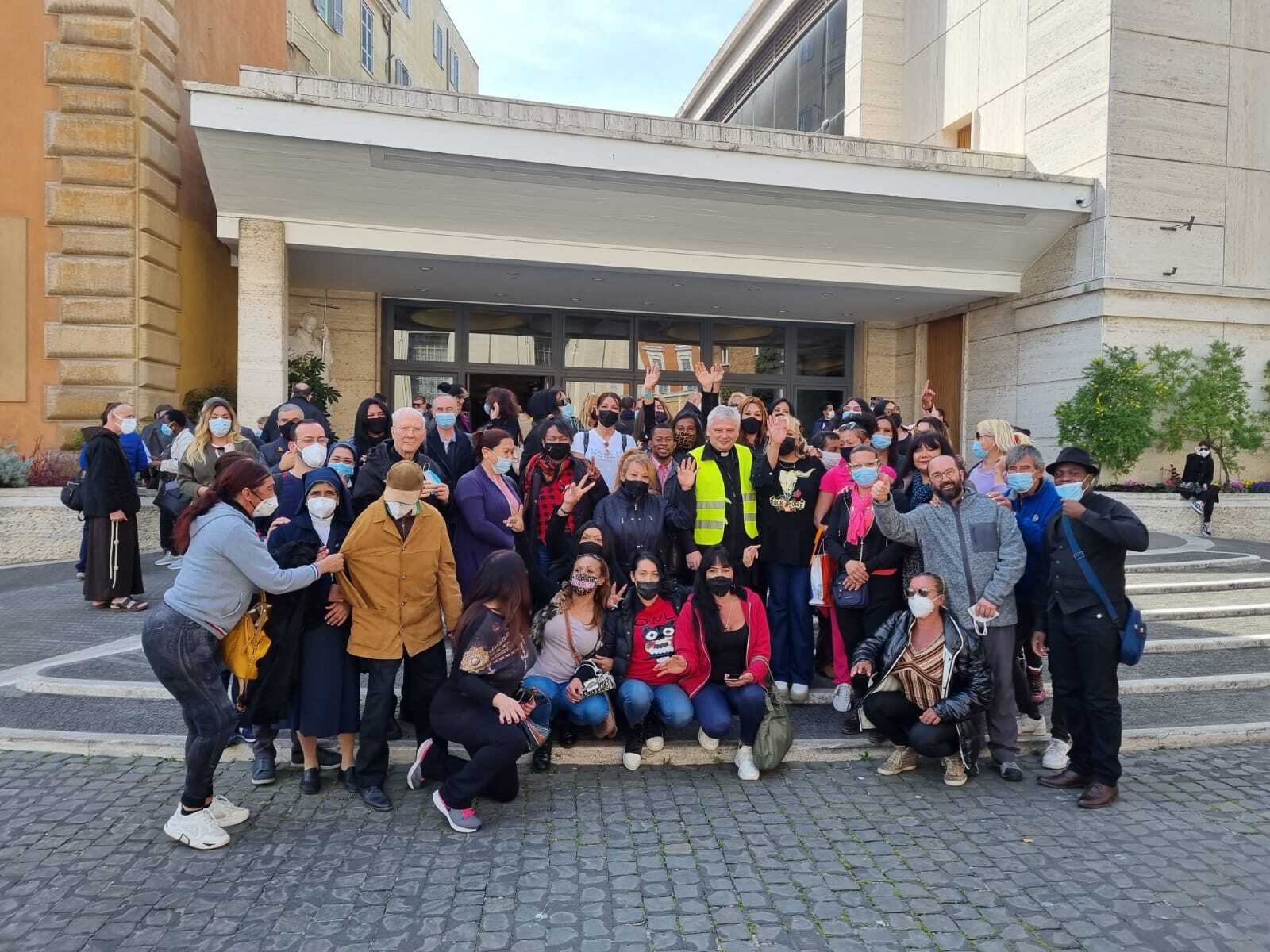
Members of a faith community from Torvaianica, Italy, including transgender individuals, volunteers and others, pose outside Paul VI Audience Hall in April after arriving at the Vatican to receive the COVID-19 vaccine. Photo courtesy of the Rev. Andrea Conocchia
The next day at the papal audience, Conocchia ushered the women forward to meet the pontiff. “When I touched his hand, I was lost for words,” Minerva Motta Nuñes said. She offered him a traditional leather cup from Peru, where she was born.
Afterward, Conocchia said, the pope told him: “Keep going, continue in this ministry, you are doing well.”
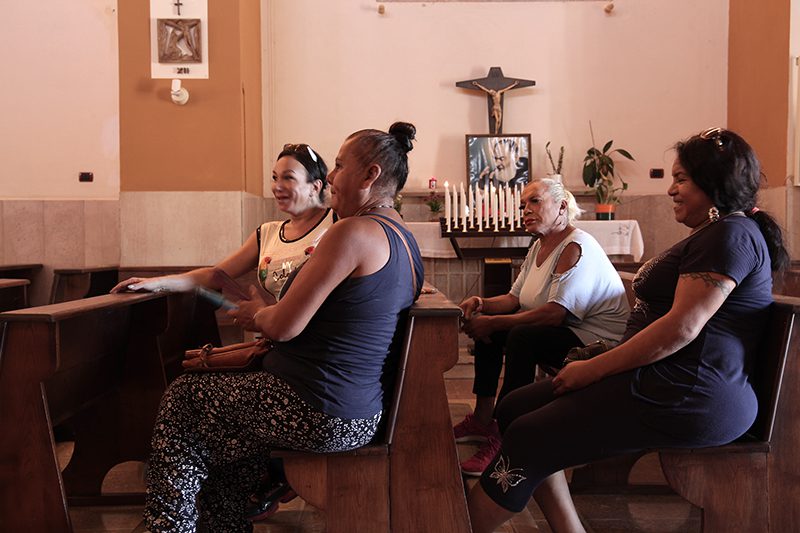
Marcella Demarco Muniz, from left, Claudia Salas, Laura and Minerva Motta Nuñes meet at the Church of the Immaculate Blessed Virgin on Monday, Sept. 5, 2022, in Torvaianica, Italy. RNS photo by Federico Manzoni
Conocchia said he has been reinvigorated by the pope’s approval, especially after Conocchia’s efforts to open the church to the LGBTQ community have led to pushback.
Some in Torvaianica were angry that the trans women received the vaccine before other residents. Conocchia admits that it’s not uncommon for disapproving members of his flock to casually ask him for how long he thinks he will be stationed at the parish.
Two local priests, both from Africa, support the pope and his message of inclusion but say focusing on questions of sexuality seems terribly out of touch with the demand for food, medicine and financial independence in their native countries.
The Rev. Blaise Mayuma Nkwa, from Congo, where there are more Catholics per capita than any nation in Africa, won’t go on Conocchia’s trips in the company of the trans women. When the subject comes up at lunch, the otherwise cheerful priest turns quiet.
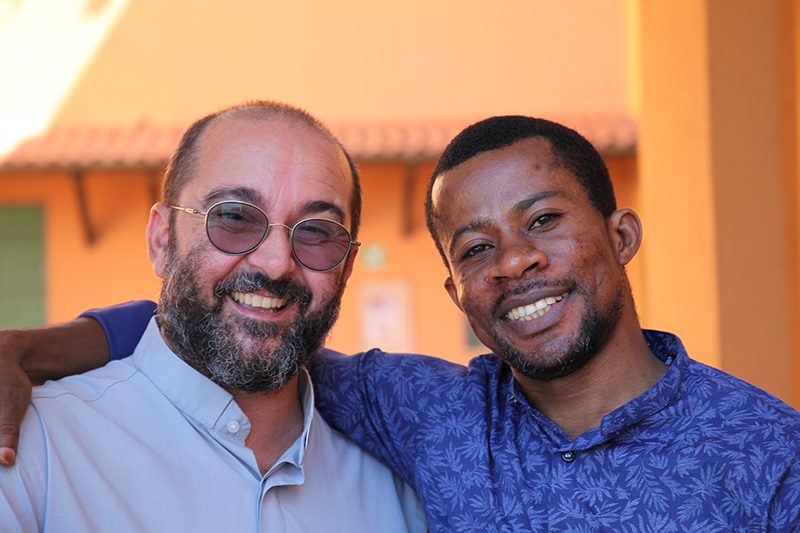
The Rev. Andrea Conocchia, left, and the Rev. Blaise Mayuma Nkwa pose together at the Church of the Immaculate Blessed Virgin on Monday, Sept. 5, 2022, in Torvaianica, Italy. RNS photo by Federico Manzoni
The Rev. Omero Mananga, Conocchia’s deputy, displays both respect and skepticism. He worries about explaining Francis’ vision to the die-hard core of old ladies at Blessed Virgin. Conocchia asks in reply, “What will happen when our little old ladies die?” before answering, mostly to himself: “It will be all over … preaching to no one in empty chapels.”
According to 2021 data from Italy’s statistics agency, ISTAT, more than 30% of those who attend Mass once a week are above the age of 75. The same report found that even in Catholic Italy, only 19% of people attend religious services regularly.
“We cannot go back,” Conocchia said one afternoon after presiding at back-to-back funerals. “Pope Francis has pushed the church in a new direction, and I worry about what will happen if we revert to the old ways.”
- Claudia Salas at the Church of the Immaculate Blessed Virgin on Monday, Sept. 5, 2022, in Torvaianica, Italy. RNS photo by Federico Manzoni
- Marcella Demarco Muniz prays at the Church of the Immaculate Blessed Virgin on Monday, Sept. 5, 2022, in Torvaianica, Italy. RNS photo by Federico Manzoni
The trans women feel the division between Francis’ vision and the reality of the church differently. Nuñes was raised Catholic but avoids attending Mass for fear of judgment. “I can’t separate myself from what I do,” said Nuñes, hinting at her work as a prostitute, “because I’m always met by the prejudice of people and the church.”
Salas echoed this feeling of rejection. People in the pews shake her hand at the sign of peace but won’t give her a glance when they pass on the street.
But Marcella Demarco Muniz said that when she was ushered forward at the general audience to meet Francis in April, he told her in Spanish: “Don’t worry, we are all the same in the eyes of God.” If she could, she said, she would visit him at every general audience.
They believe Francis’ message of inclusion is slowly changing the church. “The pope has opened many doors,” said Nuñes.
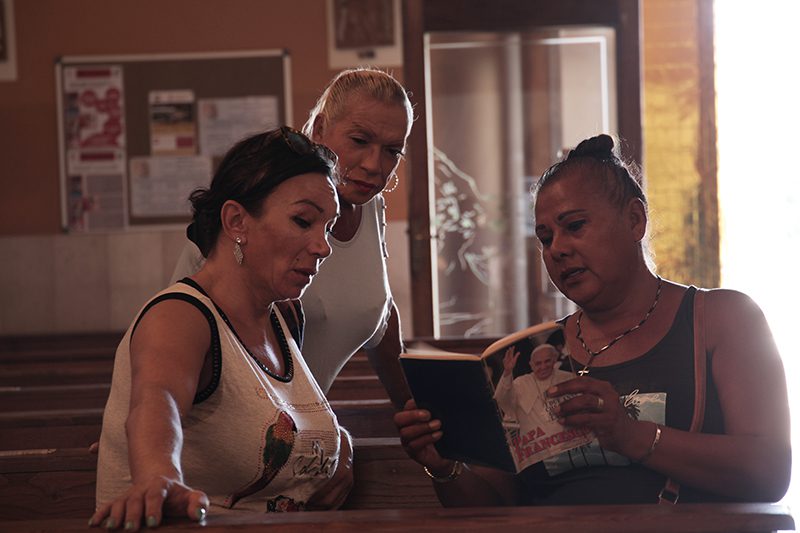
Marcella Demarco Muniz, from left, Laura and Claudia Salas look at a book about Pope Francis at the Church of the Immaculate Blessed Virgin on Monday, Sept. 5, 2022, in Torvaianica, Italy. RNS photo by Federico Manzoni
Demarco said she loved St. John Paul II and remembers his visits to South America when she was young. “But Pope Francis is everything for us,” she said. “He’s from South America and has a way with everyone.
“He moves forward as the world moves forward,” she added.
If so, it will be because Francis’ vision translates into changes like what has happened at Blessed Virgin. Conocchia sheepishly admits he has set a new standard for LGBTQ Catholics in Italy wishing to be reconciled with the church. After his openness toward trans women appeared in several newspapers, other groups from all over the peninsula contacted the priest seeking advice.
At lunch with his fellow priests, meditating on the future of the church, Conocchia had grown somewhat glum. But as he walks away to the jingling of his keys, he returns to his usual gaiety. “They don’t like it when I say it,” he said, “but this isn’t a reform. It’s a revolution.”
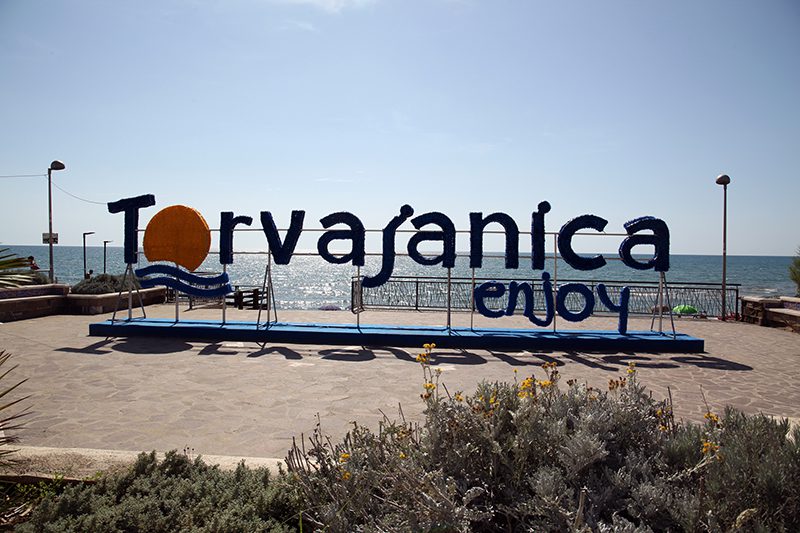
A seaside sign in Torvaianica, Italy. RNS photo by Federico Manzoni
